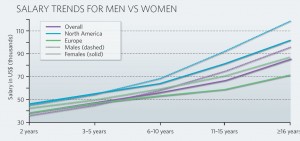A recent post on the Oncofertility Consortium Blog discussed gender disparities in the senior levels of scientific research. Women receive 56% of science and engineering undergraduate degrees and are awarded more than 40% of graduate degrees in the sciences, often a PhD. However, they make up only 22% of senior academic faculty members in the United States.
The Journal Nature may have come across another reason for the gender gap in science. Salary differences. Nature just released the results of their first-ever salary and career survey of more than 10,000 scientists. In addition to examining salaries across countries, academic stages, and industry, the study also looked across genders.

The report found that female scientists begin their post-graduate careers making slightly more than male scientists, about $45,000 per year in the United States. However, 5 years after receiving their highest degree, when scientists generally begin their first academic appointments, male scientists start to outpace females. As time progresses, this trend continues so that 16 or more years past degree completion, men make about $120,000 while female scientists hover below $105,000.
It is important to note that similar salary trends occur in both North America and Europe. According to the study, “Men’s salaries were 18% to 40% higher than women’s in the countries for which we had significant sample sizes-Australia, Germany, Italy, Spain, the United Kingdom, India, Japan, Canada, and the United States.”
The exact cause of the scientific wage gap is unknown. However, in my previous career as a scientist, I personally saw women poorly negotiate for starting salaries, producing an initial wage difference that increased over time. In addition, some of my fellow female scientists either took time off from work to raise children or opted for more-flexible, lower-paying, non-tenured positions. In my case, which occurs with many women, I foresaw that my significant other would make more money the long-term and saw myself sacrificing my career for our future family. In my transition away from the bench, I have instead avoided the “sex, science, and salary” issue altogether but the scientific community needs to learn how to keep women in the sciences or risk future scientific and medical advances. The most obvious way to do that? Money.
--
Kate is on loan from the Oncofertility Consortium. Check out their blog!

Comments